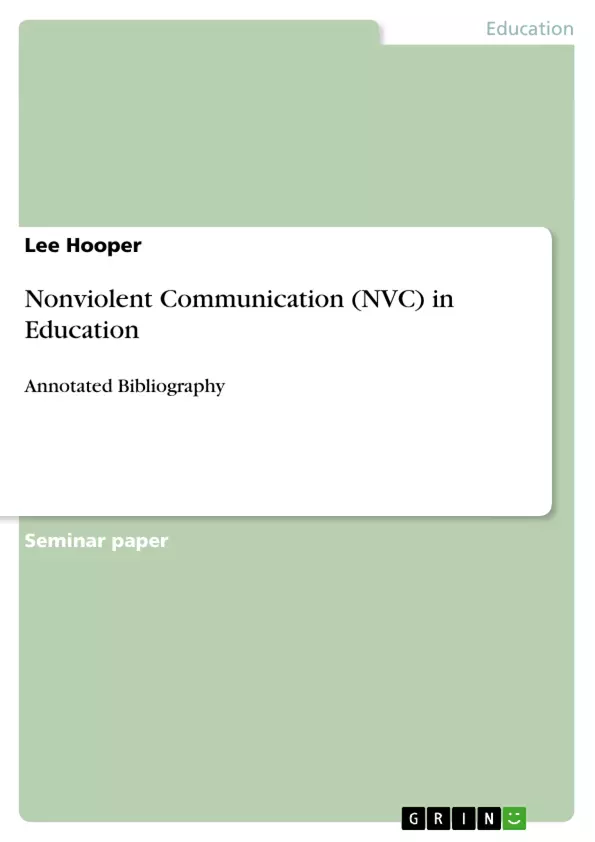Nonviolent communication (NVC) is an approach to create empathetic and honest connection amongst people using communicative techniques. NVC was first developed by Rosenberg (2003) in the 1960s. The principles of NVC are based on humanistic concepts from theorists such as Rogers, Maslow, and Fromm. NVC theory proposes that conflicts result from habitual communicative patterns whereby violent language based on emotions such as fear, guilt and anger, are used to try and meet one’s need. Universal feelings and needs are a major key point of this theory. NVC recommends the use of a four step process to help bring clarity and awareness into communication. These steps are based on observations, feelings, needs, and requests. The first step involves differentiating between observations and evaluations, so specific behaviours and actions can be identified free of judgement. The second step is to become aware of what feelings are present. The third step is to find the underlying need behind the feeling. The last step involves requesting a concrete action that can help to meet that need. Rosenberg and Eisler (2003) argue that applying NVC principles into one’s life can help us to see what is alive in ourselves, as well as in others.
Inhaltsverzeichnis (Table of Contents)
- Introduction
- YOUR TOPIC: NVC in Education
- Reference: Cooper, M. (2009). Counselling in UK secondary schools: a comprehensive review of audit and evaluation data. Counselling & Psychotherapy Research, 9(3), 137-150.
- Reference: Hart, S., & Göthlin, M. (2002). Lessons from the Skarpnäcks Free School. Encounter, 15(3), 38-42.
- Reference: Hart, S., & Kindle-Hodson, V. (2003). The compassionate classroom: Relationship-based teaching and learning (Chapter 5: Develop skills through activities and games, pp. 113-174). Encinitas, CA: PuddleDancer Press.
Zielsetzung und Themenschwerpunkte (Objectives and Key Themes)
This annotated bibliography aims to explore the impact of Nonviolent Communication (NVC) on education, specifically focusing on the relationships between students and teachers. The paper seeks to provide a systematic analysis of relevant literature, drawing together major works on NVC in relation to education.
- The principles of NVC and its application in education.
- The benefits of using NVC in fostering positive relationships between students and teachers.
- The potential of NVC to create more compassionate and empathetic educational environments.
- Challenges and limitations in implementing NVC in educational settings.
- The need for further research and empirical evidence to support the use of NVC in education.
Zusammenfassung der Kapitel (Chapter Summaries)
- The first chapter examines a meta-analysis of 30 studies on the effectiveness of humanistic counselling in UK secondary schools, providing insights into the potential benefits of humanistic approaches like NVC in education.
- The second chapter narrates the experiences of establishing and running a school in Sweden based on NVC principles, highlighting the positive impacts on student behavior, learning outcomes, and school culture.
- The third chapter presents practical games and activities designed to integrate NVC principles into classroom settings, aiming to foster compassion and empathy among students and teachers.
Schlüsselwörter (Keywords)
The primary keywords and focus topics of this annotated bibliography include Nonviolent Communication (NVC), education, student-teacher relationships, compassionate classrooms, humanistic counselling, participatory education, and empirical research.
What is Nonviolent Communication (NVC)?
NVC is an empathetic communicative approach developed by Marshall Rosenberg to create honest connections and resolve conflicts based on universal feelings and needs.
What are the four steps of the NVC process?
The four steps are: 1. Observation (without evaluation), 2. Feeling, 3. Need, and 4. Request (concrete and doable).
How can NVC benefit the classroom environment?
It helps foster positive student-teacher relationships, reduces behavioral issues, and creates a more compassionate and empathetic learning culture.
What are "compassionate classrooms"?
These are educational settings where NVC principles are integrated into daily activities to promote relationship-based teaching and learning.
Is there empirical evidence for NVC in schools?
The bibliography examines various studies and meta-analyses, such as humanistic counseling in UK schools, to evaluate the effectiveness of NVC-related approaches.
What are the challenges of implementing NVC in education?
Challenges include the need for extensive training, overcoming habitual communication patterns, and integrating NVC into rigid traditional school structures.



